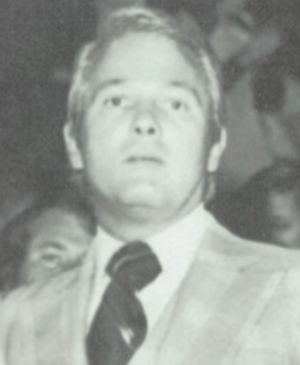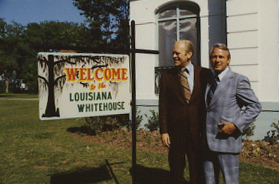Edwin Edwards facts for kids
Quick facts for kids
Edwin Edwards
|
|
|---|---|
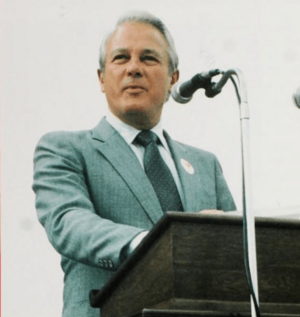 |
|
| 50th Governor of Louisiana | |
| In office January 13, 1992 – January 8, 1996 |
|
| Lieutenant | Melinda Schwegmann |
| Preceded by | Buddy Roemer |
| Succeeded by | Mike Foster |
| In office March 12, 1984 – March 14, 1988 |
|
| Lieutenant | Robert Louis Freeman Sr. |
| Preceded by | Dave Treen |
| Succeeded by | Buddy Roemer |
| In office May 9, 1972 – March 10, 1980 |
|
| Lieutenant | Jimmy Fitzmorris |
| Preceded by | John McKeithen |
| Succeeded by | Dave Treen |
| Associate Justice of the Louisiana Supreme Court | |
| In office April 14, 1980 – December 1, 1980 |
|
| Member of the U.S. House of Representatives from Louisiana's 7th district |
|
| In office October 2, 1965 – May 9, 1972 |
|
| Preceded by | Ashton Thompson |
| Succeeded by | John Breaux |
| Member of the Louisiana Senate from the 35th district |
|
| In office May 12, 1964 – October 2, 1965 |
|
| Preceded by | Bill Cleveland |
| Succeeded by | Howard A. Duncan |
| Personal details | |
| Born |
Edwin Washington Edwards
August 7, 1927 Avoyelles Parish, Louisiana, U.S. |
| Died | July 12, 2021 (aged 93) Gonzales, Louisiana, U.S. |
| Political party | Democratic |
| Spouses |
Candace Picou
(m. 1994; div. 2004)Trina Grimes Scott
(m. 2011–2021) |
| Children | 5 |
| Education | Louisiana State University (BA, JD) |
| Military service | |
| Allegiance | United States |
| Branch/service | United States Navy |
| Years of service | 1945–1946 |
| Battles/wars | World War II |
Edwin Washington Edwards (born August 7, 1927 – died July 12, 2021) was an American politician. He was a member of the Democratic Party. Edwards served as a U.S. Representative for Louisiana from 1965 to 1972. He also served as the 50th governor of Louisiana for four terms. This was twice as many elected terms as any other Louisiana governor. He served a total of 16 years as governor. This makes his time in office one of the longest in U.S. history.
Edwards was a very important person in Louisiana politics. He was known for his unique style. He was sometimes called the "last of the New Deal Southern Democrats". He faced legal challenges during his career. In 2001, he was sentenced to federal prison. Edwards began his sentence in October 2002. He was released in January 2011, after serving eight years. He was also seen as the last major politician connected to the powerful political families of Huey Long and Earl Long.
In 2014, Edwards ran for the U.S. House of Representatives again. He ran to represent Louisiana's 6th district. He won the first round of voting, called the "jungle primary". However, he lost to Republican Garret Graves in the runoff election. This showed that his popularity had decreased. It also showed the Republican Party of Louisiana was becoming stronger in the state.
Contents
- Early Life and Political Start
- First Governor Campaign: 1971–1972
- First Two Terms as Governor: 1972–1980
- First Political Comeback: Edwards vs. Treen, 1983
- Third Term as Governor: 1984–1988
- Defeat: Edwards vs. Roemer, 1987
- Second Comeback: Edwards vs. Duke, 1991
- Fourth Term as Governor: 1992–1996
- Later Life and Legal Issues
- 2014 Congressional Election
- Edwards' Long Career
- Personal Life
- Images for kids
- See also
Early Life and Political Start
Edwin Washington Edwards was born in a rural area of Avoyelles Parish. This was near Marksville. His father, Clarence Edwards, was a sharecropper. His mother, Agnès Brouillette, spoke French. Edwards' family were early French colonists in Louisiana.
Young Edwards first planned to become a preacher. He even preached for the Marksville Church of the Nazarene. He served briefly in the U.S. Navy Air Corps near the end of World War II. After the military, he graduated from Louisiana State University Law Center at age 21. He then started practicing law in Crowley. He moved there because his sister told him there were not many French-speaking lawyers.
Edwards started his political career in 1954. He was elected to the Crowley City Council. He was a member of the Democratic Party. At that time, this party held most public offices in Louisiana. Edwards stayed on the Crowley council until 1964. That year, he was elected to the Louisiana State Senate. He won against Bill Cleveland, who had been in the legislature for 20 years.
First Governor Campaign: 1971–1972
In the 1971–1972 election, Edwards won the governorship. He finished first among 17 candidates in the Democratic primary. His strongest support came from southern Louisiana. Many Cajun, Creole, and African-American voters supported him.
Both Edwards and his main opponent, Johnston, promised reforms. But Edwards was better at making political deals. He built strong alliances for the final round of voting. Edwards said he cared more about the "problems of the poor" than Johnston did.
First Two Terms as Governor: 1972–1980
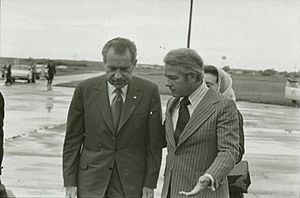
Edwards became governor on May 9, 1972. He was known for being a very colorful and lively politician. He was charismatic, well-dressed, and quick with jokes. He remained very popular with the public.
One of his first actions was to call for a new state constitution. The old one was very long and outdated. A special meeting was held in 1973. The new constitution was put into effect in 1975. It is still used today. Edwards also reorganized the state government. He got rid of over 80 state agencies.
Key Policies and Achievements
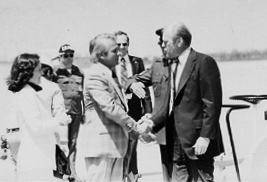
Edwards changed how state elections worked. He created the "nonpartisan blanket primary" system. In this system, all candidates run together in one primary election. The top two candidates then go to a runoff. This system helped the Republican Party grow in Louisiana. Some people jokingly called Edwards the "father of Louisiana's Republican Party."
Edwards' time in office in the 1970s saw a big boom in Louisiana's oil and gas industry. He increased the state's oil revenues. He did this by changing how severance taxes were calculated. This oil money led to a huge increase in state spending. State spending went up by 163% between 1972 and 1980. Edwards was able to keep the state budget balanced because of this extra money. Much of this money went to health and human services. It also increased funding for schools and higher education.
Edwards easily won reelection in 1975. He received 62.3 percent of the votes.
First Political Comeback: Edwards vs. Treen, 1983
Edwards could not run for a third term right after his second. So, he left politics in 1980. But he made it clear he would run again in 1983. He started raising money and traveling the state early.
In 1983, Edwards defeated the re-election attempt of Republican David Treen. Treen had been elected governor in 1979. The election showed a clear difference between the lively Edwards and the quiet Treen. Treen focused on Edwards' reputation. Edwards tried to make Treen seem unable to lead. The two candidates spent over $18 million. This made it one of the most expensive campaigns in Louisiana's history.
Third Term as Governor: 1984–1988
State finances became very difficult during Edwards' third term. Money from oil taxes dropped sharply in the mid-1980s. This was because oil prices fell. In 1984, Edwards tried to fix the money problems. He approved new taxes, including a sales tax increase. The state legislature passed these taxes. However, the taxes were very unpopular. This hurt Edwards' public support.
Edwards' popularity had been high in the 1970s due to good economic times. With the economy getting worse, his popularity went down. To get the new taxes passed, Edwards showed lawmakers Treen's proposed budget. He claimed it would cut state spending too much. Edwards argued that if lawmakers passed Treen's budget, roads would fall apart. He also said bridges would collapse. In the end, Edwards got most of what he wanted. He used the idea of teacher pay raises to pressure lawmakers.
Legal Challenges and Acquittal
In February 1985, Edwards faced legal challenges. These were brought by U.S. Attorney John Volz. Edwards said he was innocent. He insisted the charges were politically motivated. The first trial ended without a decision in December 1985. A second trial in 1986 resulted in him being found not guilty. After Edwards and his co-defendants were found not guilty, Edwards joked about the jury. He said he had been judged by a "jury of my peers."
After the trial, Edwards supported making gambling legal. He saw it as a way to solve the state's money problems. This idea further lowered his popularity. He had also made unpopular budget cuts to education. In 1986, he argued that legalizing casinos and a state lottery would help. But the state legislature rejected his ideas. Going into the 1987 election, Edwards seemed vulnerable. His disapproval ratings were very high.
Defeat: Edwards vs. Roemer, 1987
Many candidates ran against Edwards in the 1987 election. One strong challenger was Republican Congressman Bob Livingston. Other candidates included Billy Tauzin and Jim Brown. Buddy Roemer, a Democratic congressman, also ran. Roemer started with low poll numbers but gained support.
Edwards was the main topic of the campaign. Even though he was weaker, Edwards was expected to make it to the runoff election. The question was who his opponent would be. Many thought Edwards needed Livingston, a Republican, in the runoff. Livingston was seen as less charismatic. This would give Edwards an advantage. A moderate Democrat would be more dangerous.
A key moment happened at a candidate forum. Candidates were asked if they would support Edwards in the general election if they didn't make the runoff. Most candidates avoided a direct answer. But Buddy Roemer said, "No, we've got to slay the dragon. I would endorse anyone but Edwards." The next day, Roemer's campaign started using "Slay the Dragon" buttons. Roemer quickly rose in the polls. On election night, he finished first in the primary. Edwards came in second. This was the first time Edwards did not finish first in an election.
Edwards then withdrew from the contest. This automatically made Buddy Roemer governor. By withdrawing, Edwards prevented Roemer from building a strong winning group. He also passed the state's problems to the new governor. Edwards quietly waited for a chance to return to power.
Second Comeback: Edwards vs. Duke, 1991
As the 1991 governor's race approached, many friends told Edwards not to run. They thought he had no chance to win. A journalist once joked that Edwards could only win again if he ran against Adolf Hitler. This joke became surprisingly true. After the 1991 primary, Edwards' runoff opponent was David Duke. Duke was a former leader of the Knights of the Ku Klux Klan. Edwards received 34 percent of the vote, and Duke received 32 percent. Governor Roemer finished third.
The runoff election gained national attention. It was between a former governor who had faced legal issues but was seen as friendly to minorities, and a white supremacist. Support for Edwards grew. A group called the Louisiana Coalition against Racism and Nazism worked against Duke. They showed that Duke was still involved in Ku Klux Klan activities.
Many people who didn't usually support Edwards now found him to be the better choice. Edwards received support from Treen and Roemer. Even Republican President George H. W. Bush urged people to vote for Edwards. A popular bumper sticker said, "Vote For the Crook. It's Important." Another said, "Vote for the Lizard, not the Wizard." Edwards said this would be his last term. He wanted to leave a good legacy. This made many hope that past issues would not happen again. Edwards won by a large margin. He defeated Duke 61 to 39 percent.
Fourth Term as Governor: 1992–1996
In his last term, Edwards asked his childhood friend, Raymond Laborde, to be his commissioner of administration. Laborde had been in the state House for 20 years. Edwards also invited Kevin P. Reilly Sr. to be the secretary of economic development.
In 1992, Edwards appointed Richard Stalder as secretary of the Louisiana Department of Public Safety & Corrections. This job used to go to political supporters. Stalder stayed in this role for three more governors.
During this term, Edwards pushed for casino gambling in Louisiana. This was a big part of his 1991 campaign. In June 1992, the state legislature passed a bill for a large land-based casino in New Orleans. He also appointed a board that approved 15 floating riverboat casinos. He appointed a political ally, Paul Fontenot, to lead the State Police. Fontenot would oversee the licensing of casino operators. Edwards also showed his support for civil rights. He became the first Southern governor to issue an order protecting lesbian, gay, and bisexual people from discrimination in state services.
Edwards announced in June 1994 that he would retire from politics. He was succeeded as governor by State Senator Murphy J. Foster Jr.. Foster ran as an opponent of gambling interests. Edwards retired to a new home in Baton Rouge. He planned to return to practicing law.
Later Life and Legal Issues
Edwards faced more legal challenges after leaving office. In 1998, he was accused by the federal government. The prosecution released recordings and videos. These seemed to show questionable financial dealings. The investigation also led to the conviction of San Francisco 49ers owner Edward J. DeBartolo Jr.. DeBartolo admitted to paying Edwards money for help getting a casino license.
Edwards was found guilty on many charges. His son Stephen was also convicted. "I did not do anything wrong as a governor," Edwards told the press. On his way to prison, he said, "I will be a model prisoner, as I have been a model citizen." From 2002 to 2004, Edwin Edwards was held at the Federal Medical Center in Fort Worth.
In 2005, Edwards was moved to the Federal Correctional Institution in Oakdale. He served as the facility's librarian. He helped other inmates get their GEDs. He was scheduled to be released on July 6, 2011.
Some of Edwards' former political rivals and allies tried to get him a pardon. They asked U.S. Presidents George W. Bush and Barack Obama. But a pardon was not granted.
On January 13, 2011, Edwards was released from prison. He served the rest of his sentence at a halfway house. His sentence ended on July 6, 2011. He then began three years of probation. On February 7, 2013, he was granted early release from probation for good behavior.
In a poll taken in October 2011, 30 percent of people named Edwards the state's best governor since 1980.
2014 Congressional Election
In February 2014, Edwards announced he was thinking about running for Congress again. He wanted to represent Louisiana's 6th congressional district. This district is mostly Republican. Edwards said, "I'm the only hope the Democrats have here." He formally announced his candidacy on March 17. He said he would give it his best effort.
Many people thought Edwards would make it to the runoff election. This was because he was so well-known. But they doubted he could win in a strong Republican district. Edwards' strategy was to appeal to black and Cajun voters. He also campaigned on college campuses to reach younger voters.
Edwards finished first in the primary election. He received 77,862 votes (30.1 percent). He then faced Republican Garret Graves in the runoff election. Graves had received 70,706 votes (27.4 percent). Edwards lost to Graves by a 62–38 percent margin in the runoff. This was only the second loss of his political career.
Edwards' Long Career
Edwards had one of the longest times as governor in U.S. history. He served for 5,784 days. Few governors have served four four-year terms. Edwards was among a small group of governors who served 16 years.
Veteran journalist Iris Kelso once called Edwards "the most interesting" of the six governors she had covered. She found him even more colorful than Earl Long.
Personal Life
Marriages and Family
In 1949, Edwards married Elaine Schwartzenburg. They had four children. In 1972, Edwards appointed her as a U.S. senator for a short time. They divorced in 1989 after 40 years of marriage.
In 1994, Edwards married Candy Picou. He filed for divorce from her in 2004.
In July 2011, Edwards married Trina Grimes. She was his pen pal while he was in prison. He was 83, and she was 32. On August 1, 2013, they had a child together. In 2013, Edwards and Trina starred in a reality show called The Governor's Wife. It was about their life together.
Health and Death
In 2015, Edwards was hospitalized for pneumonia. He was hospitalized again for pneumonia in December 2016.
In November 2020, Edwards was taken to the hospital again. He had trouble breathing. He returned home after two nights. It was reported that he had a common cold. He tested negative for COVID-19, pneumonia, and the flu. His wife said he was resting well and "giving orders" once he got home.
Edwards went into hospice care on July 6, 2021. He died six days later on July 12, 2021. He was 93 years old. The cause of death was breathing problems. At the time of his death, Edwards had outlived four of the governors who came after him. These included Dave Treen, Buddy Roemer, Mike Foster, and Kathleen Blanco.
Images for kids
See also
 In Spanish: Edwin Edwards para niños
In Spanish: Edwin Edwards para niños
 | Aurelia Browder |
 | Nannie Helen Burroughs |
 | Michelle Alexander |


